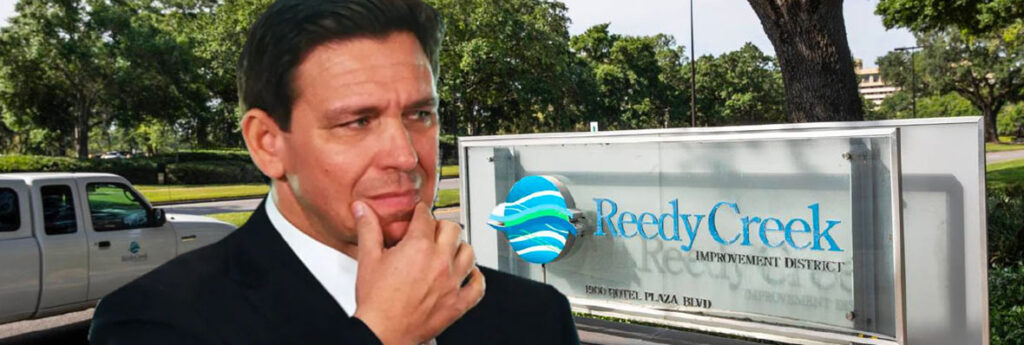Disney’s government in Florida has been the envy of any private business, with its unprecedented powers in deciding what to build and how to build it at the Walt Disney World Resort. Those days are numbered as a new bill released this week puts the entertainment giant’s district firmly in the control of Florida’s governor and legislative leaders in what some see as punishment for Disney’s opposition to the so-called “Don’t Say Gay” law championed by Republican Gov. Ron DeSantis and the Republican-controlled Legislature.
“Disney won’t like it because they’re not in control,” said Richard Foglesong, professor emeritus at Rollins College, who wrote a definitive account of Disney’s Reedy Creek Improvement District in his book, “Married to the Mouse: Walt Disney World and Orlando.”
With that loss of control comes an uncertainty about how Disney’s revamped government and Walt Disney World, which it governs, will work together – whether the left hand always will be in synch with the right hand as it has been with the company overseeing both entities.
The uniqueness of Disney’ government, where building inspectors examine black box structures holding thrill rides instead of office buildings, also complicates matters. The district essentially runs a midsize city. On any given day, as many as 350,000 people are on Disney World’s 27,000 acres (11,000 hectares) as theme park visitors, overnight hotel guests or employees. The 55-year-old district has to manage the traffic, dispose of the waste and control the plentiful mosquitoes.
“What kind of control is preferable? Control by a private business or corporation, or control by appointed officials, appointed by governor of the state?” Foglesong said. “Will they have the expertise to be able to make the new district work as efficiently as the old district works?”
The creation of the Reedy Creek district was instrumental in Disney’s decision to build near Orlando in the 1960s, when company leaders told the state they planned to build a futuristic city — the Experimental Prototype Community of Tomorrow, also known as Epcot.
The proposed city was to include a rapid transit system and urban planning innovations, so Disney needed autonomy in the district for building and deciding how to use the land, they said. The futuristic city never materialized, and instead Epcot morphed into a second theme park that opened in 1982.
The bill prohibits anybody who has worked or had a contract with a theme park or entertainment complex in the past three years, or their relatives, from serving on the revamped district’s board of supervisors, a prohibition that some experts say eliminates people with expertise in the field.
The bill’s sponsor, Florida Rep. Fred Hawkins, a Republican from St. Cloud, defended the exclusion Tuesday.
“This was a provision I requested,” Hawkins said. “We want to try to avoid any conflicts of interest of the new board members.”
Under the bill’s proposals, Florida’s governor appoints the five-member board of supervisors to the renamed Central Florida Tourism Oversight District instead of Disney. Limits would be placed on the district’s autonomy by making it subject to oversight and regulation by state agencies, and it would be unable to adopt any codes that conflict with state regulations. The district also would no longer have the ability, if it wanted, to own and operate an airport, stadium, convention center or nuclear power plant.
DeSantis started gunning for Disney’s private government last year when the entertainment giant publicly opposed what critics call the “Don’t Say Gay” law, which bars instruction on sexual orientation, gender identity and other lessons deemed not age-appropriate in kindergarten through third grade. Republican critics of the Disney district also argued it has given the company an unfair advantage over rivals in issuing bonds and financing expansion.
The legislature passed a bill last year dissolving the Disney government in June 2023.
Florida Rep. Anna Eskamani, a Democrat from Orlando, called the bill on Monday a “power grab” by DeSantis, a potential 2024 presidential candidate who has emerged as a fierce opponent of what he describes as “woke” policies on race, gender and public health. Such positions endear him to the GOP’s conservative base but threaten to alienate independents and moderate voters in both parties who are influential in presidential politics.
To the relief of taxpayers in neighboring Orange and Osceola counties, the district won’t be dissolved, a prospect that had raised fears that the counties would have to absorb the district’s responsibilities and raise property taxes significantly. The Reedy Creek Improvement District has more than $1 billion in bond debt.
In a statement, Orange County said officials were monitoring the bill.
The new bill appears to address some key questions raised by last year’s legislation, primarily preserving the district’s ability to raise revenue and service outstanding debt, said Michael Rinaldi, head of local government ratings for Fitch Ratings.
Foglesong expects a legal challenge should the bill pass. Disney didn’t respond to an inquiry asking about any potential lawsuits.
“Disney works under a number of different models and jurisdictions around the world, and regardless of the outcome, we remain committed to providing the highest quality experience for the millions of guests who visit each year,” Jeff Vahle, president of Walt Disney World Resort, said in a statement.
Disney could make an argument that their rights as a private business are being undermined, Foglesong said.
“It will have political appeal, the arguments they make, in a Republican state for a potential presidential candidate,” Foglesong said. “It will be like, legally, `How can you do this to us?’ and politically, `How can you do this to a corporation that has done so much for the state of Florida?’”

